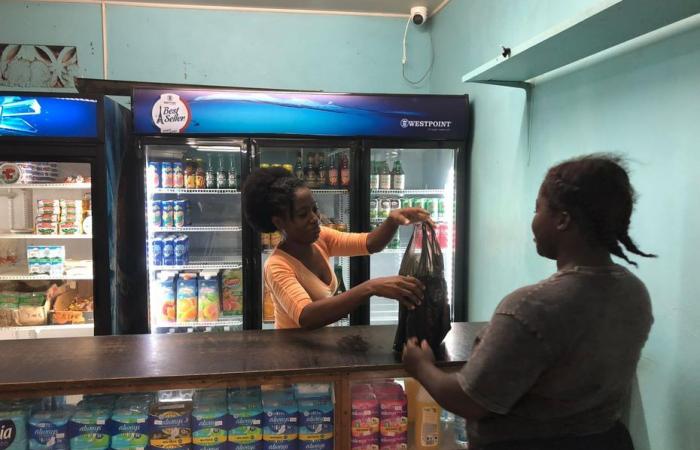Guyana has been affected by a severe drought in recent weeks. Transport by canoe is almost at a standstill and supplying the river communities is difficult. In Maripasoula, some shelves are empty in the village's convenience stores and it is difficult for residents to get food.
Laura Philippon/Emma Chevaillier/Sefian Deie
•
Published on November 7, 2024 at 5:45 a.m.
“I just paid 7 euros for a two-liter bottle of juice,” exclaims Noni, 19 years old. Everything is expensive! »
Noni comes out of one of the three mini markets in Maripasoula. Last week, she crossed the river to go shopping in Surinam. “It’s expensive too and they lack products,” remarks the mother of three children.
For 18 months, Guyana has been facing a rainfall deficit which is aggravating the current drought. In recent weeks, it has not rained on the Maroni. The river level continues to fall,
•
©Laura Philippon
“Less than 5 cm of water per day”breathes a customary chief from Haut-Maroni.
The Mankaasiaba jump – the man lying across – is aptly named because it has become impassable. Here, canoe transport is almost at a standstill. Access to the largest commune in France by river is now almost impossible.
Supply is limited to air freight and in the village fresh products and basic necessities are starting to become scarce.
•
©Laura Philippon
On October 31, the prefecture launched an ORSEC water plan to coordinate the delivery of foodstuffs to isolated communities, but the effects on site are slow to come.
•
©Laura Philippon
“There are a lot of products missing from the shelves,” notes Filomin Manotini, professor at Maripasoula college. I take what I can find, bread, pasta. I just did 39 euros worth of shopping but I don’t have much in my bags.”
•
©Laura Philippon
No bottle of oil, no pack of water, products are missing from the supermarket shelves and those that remain are at exorbitant prices. The 5 kilo bag of rice costs 30 euros, the box of powdered milk for children costs 26 euros, the pack of water costs 18 euros when available and the rare gas bottles still for sale in Maripasoula are priced at 100 euros.
•
©Laura Philippon
“There are things I no longer buy, rice has become too expensive, I favor products for my children”explains Rosiane Agelisas, member of the Apachi collective which campaigns for the opening up of Guyana.
According to the Apachi collective, the drought and its supply difficulties should have been anticipated by the State. Rosiane Agelisas also denounces the lack of price control.
From a usual “shopping” budget of 80 euros per week, this mother now spends nearly 150 euros to fill her fridge.
France






